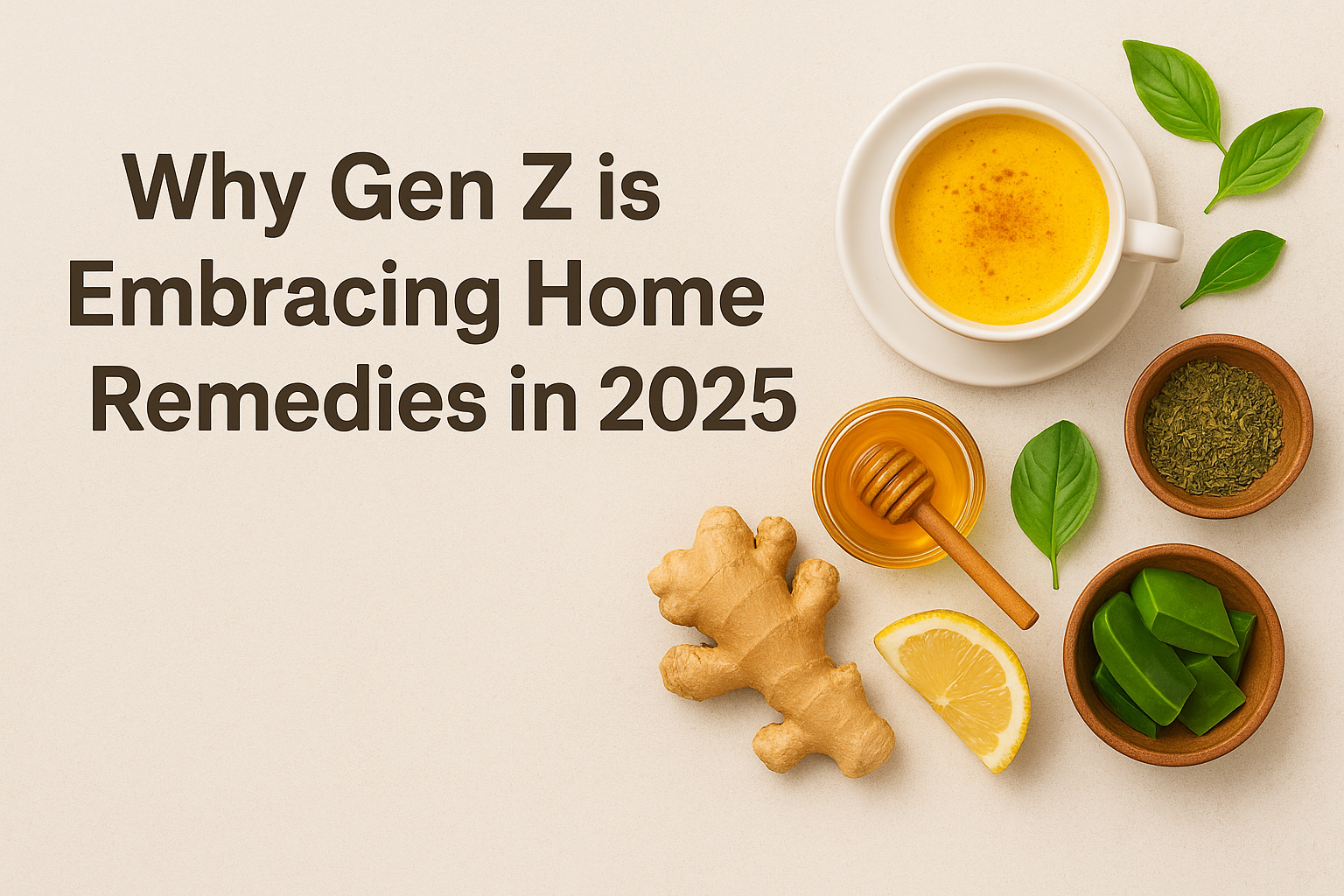Introduction: A Generation Redefining Wellness
In 2025, the wellness landscape looks very different — and Gen Z is at the forefront of this transformation. While previous generations leaned heavily on modern medicine and quick-fix solutions, today’s youth are rediscovering the value of ancient, natural remedies. From turmeric lattes to aloe vera skincare and ginger teas, home-based wellness is no longer just a grandmother’s tradition — it’s a lifestyle movement embraced by millions of young people worldwide.
So, what’s fueling this shift? Gen Z’s embrace of home remedies in 2025 reflects more than just health preferences; it signals a deeper desire for sustainability, authenticity, and self-empowerment.
The Wellness Awakening: Why Gen Z Prefers Natural Healing
According to a 2025 report by the Global Wellness Institute, nearly 68% of Gen Z consumers now prefer natural or herbal solutions before turning to over-the-counter medications. This change stems from three key motivations:
- Transparency: Gen Z wants to know what goes into their bodies — every ingredient, every effect.
- Sustainability: Home remedies reduce dependence on chemical-based products and align with eco-friendly lifestyles.
- Control: Creating personal remedies allows them to take charge of their well-being rather than relying solely on external systems.
This generation is blending ancient wisdom with digital learning — finding recipes, scientific explanations, and wellness routines through social media platforms like TikTok and Instagram, where hashtags like #NaturalHealing and #DIYWellness have millions of views.
The Influence of Social Media and Digital Communities
For Gen Z, social media isn’t just entertainment — it’s education. Platforms like YouTube, TikTok, and Pinterest have turned holistic living into a global conversation. Influencers demonstrate easy home remedies for glowing skin, better immunity, or anxiety relief — often backed by credible wellness experts or ayurvedic practitioners.
A 2024 study from Wellness Market Insights revealed that 75% of Gen Z users trust peer recommendations and online creators over traditional advertisements. This social validation has made natural wellness both accessible and aspirational.
Modern Challenges, Ancient Solutions
Post-pandemic stress, sedentary habits, and digital overload have made Gen Z more health-conscious than ever. Instead of relying solely on pharmaceuticals, they’re seeking gentler, preventive solutions.
Some of the most popular home remedies among Gen Z in 2025 include:
- Herbal teas (chamomile, tulsi, and peppermint) for mental calmness
- DIY face masks using honey, turmeric, and aloe vera
- Immunity boosters like ginger, lemon, and amla shots
- Essential oils and aromatherapy for better sleep and focus
These remedies not only promote physical health but also support emotional balance — a key concern for a generation navigating burnout and digital fatigue.
Cultural Reconnection and Global Fusion
Interestingly, Gen Z isn’t just following trends; they’re reviving cultural traditions. Indian ayurvedic practices, Chinese herbal medicine, and Western herbalism are merging into a global wellness identity. The accessibility of this information online has allowed young people to reconnect with their roots while also experimenting with multicultural remedies.
This global fusion reflects Gen Z’s inclusive mindset — where wellness is both ancestral and innovative, ancient yet personalized.
The Economic and Environmental Edge
The return to home remedies is also economically and environmentally smart. With rising healthcare costs, Gen Z views natural wellness as both affordable and sustainable. Homemade remedies use simple, biodegradable ingredients — reducing waste from packaged beauty and health products.
This sustainability factor has influenced brands too. Companies are now formulating eco-friendly, ayurvedic-inspired products to cater to Gen Z’s preferences, bridging traditional wisdom and modern convenience.
Expert Insights: The Science Behind the Trend
Health experts see merit in this shift. According to Dr. Meera Kapoor, an Ayurvedic practitioner, “Gen Z’s curiosity is a gift — they’re asking the right questions about holistic well-being. Home remedies, when used mindfully, support preventive care and align with the body’s natural rhythms.”
Moreover, scientific studies continue to validate traditional remedies. Turmeric’s anti-inflammatory benefits, ginger’s digestive support, and aloe’s skin-healing properties are now well-documented — giving young users both cultural and clinical confidence in their choices.
Conclusion: A Holistic Future Driven by Gen Z
As 2025 unfolds, one thing is clear — Gen Z is redefining wellness for the modern age. Their embrace of home remedies isn’t a rejection of modern medicine but a movement toward balance. They’re merging technology, culture, and sustainability to create a new era of health — one rooted in mindfulness and self-awareness.
In an age of fast cures and endless information, Gen Z’s return to simplicity may be the most revolutionary act of all.
FAQs Section
Why are Gen Z interested in home remedies?
Gen Z values authenticity, sustainability, and natural living. Home remedies align with their desire for transparency and self-care while avoiding harsh chemicals.
What are the most popular home remedies among Gen Z in 2025?
Turmeric milk, aloe vera gel, herbal teas, and honey-based skincare are among the top favorites for immunity, beauty, and relaxation.
Are home remedies scientifically proven?
Many home remedies — such as turmeric for inflammation or ginger for digestion — are backed by modern research, though they should complement, not replace, medical treatment.
How does social media influence Gen Z’s wellness choices?
Social media platforms help Gen Z access wellness knowledge quickly and connect with holistic influencers who share DIY health practices.
Is this trend sustainable long-term?
Yes. Home remedies promote sustainability, reduce waste, and support natural health — aligning perfectly with Gen Z’s eco-conscious lifestyle.

